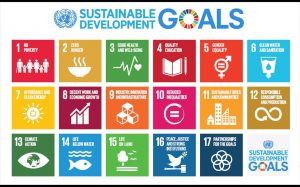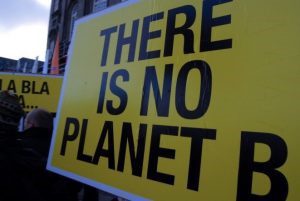This week’s guest blog comes courtesy of Onna Malou van den Broek, a second year doctorate student at King’s in the European & International Studies Department. Onna’s doctorate project titled: ‘The Political Payoff of Corporate Social Responsibility (CSR): CSR as a Determinant for Lobbying Success’, looks at the relationship between corporate sustainability and lobbying, holding a special focus on the Sustainable Development Goals(SDGs).
The views presented do not necessarily reflect those of King’s Sustainability.
The Sustainable Development Goals:
17 Goals to Transform the World by 2030
“This is no plan B because there is no planet B”, are the famous words of Ban Ki-moon, the former Secretary-General of the United Nations (UN). In 2015, the agenda for sustainable development was set by the UN member states. The Sustainable Development Goals (SDGs) is a collective action plan concerning sustainable social, economic, and ecological advancement for everyone. The aim is to leave no one behind. In this article, I will briefly introduce you to the goals in general. In the upcoming months I hope to familiarize you with each individual goal by writing seventeen separate articles on them.
The 2030 agenda
The SDGs take over the Millennium Development Goals (MDGs), which were effective from 2000 to 2015. The MDGs contributed to halving child mortality and lifting more than a billion people out of extreme poverty, to name but a few examples. Nevertheless, they did not tackle the root causes of underdevelopment. One of the reasons was that the MGDs Goals were only focused on developing countries and at providing developmental aid and assistance. The goals encompass broad social objectives targeted at governments but without measurement tools to evaluate process. The SDGs, on the other hand, target all countries and concern overall investments. They cover a combination of social, economic, and ecological goals targeted at the whole world population and with measurement mechanisms.
17 goals, 169 targets, and 232 indicators
The 17 goals cannot, and should not, be understood as separate entities; the success of one goal is closely related to the achievement of the other goals. The goals are broad and ambitious in their scope. For example, the first goal objective is that nobody should live in poverty by 2030 (“zero poverty”). Each goal is broken down in several targets. The overall 169 targets give the global goals more substance and depth. They specify the various aspects that constitute the goals and indicate when the goal is successfully achieved in 2030. As an example, one of the targets that specifies the first goal refers to the fact that the amount of people in extreme poverty must be halved in 2030. One important improvement is that these targets can then be measured through accurate and dynamic data. The overall 232 indicators link existing datasets to the targets to facilitate the measurement, and evaluation, of progress. To measure is to know!
The Global Goals in your backyard
Under the title “Global Goals”, several organisations around the world are organising events and actions to create awareness of the SDGs and to mobilise people to contribute to the accomplishment of the goals. These events are diverse and differ in scale. Worldwide, there are various events around the subject how to make the SDGs “local business”. In the UK context, the UN Global Compact Network UK organizes the SDG Roadshow, which focuses on how businesses can align their strategies with the SDGs (1). Furthermore, in London Fashion United, a leading fashion trade event, has recently launched the “Power of One”. Through this campaign they aim to raise awareness for the Global Goals and in particularly for ethical and sustainable fashion.
The Sustainable Development Goals are also for you!
What encompasses these 17 goals precisely? How are we progressing? Who contributes towards their achievement? What can I do?
During an internship for the United Nations in 2016, I was responsible to find answer to these questions and communicate them to various people. I observed that although everyone is convinced of the importance of the SDGs, they often get stuck in the web of goals, targets and indicators. Meanwhile, I have started working on my PhD at King’s College London and have noticed that there is quite a bit of uncertainty on the SDGs amongst students.
To contribute to a better world, I want to make the SDGs more concrete and accessible for you. To do so, I will write an article about every goal in which I explain what the specific goal means and sketch the current situation. I will give examples of initiatives addressing the specific goal and suggests ways for you to contribute as well. Will you help to build a better world?
References



